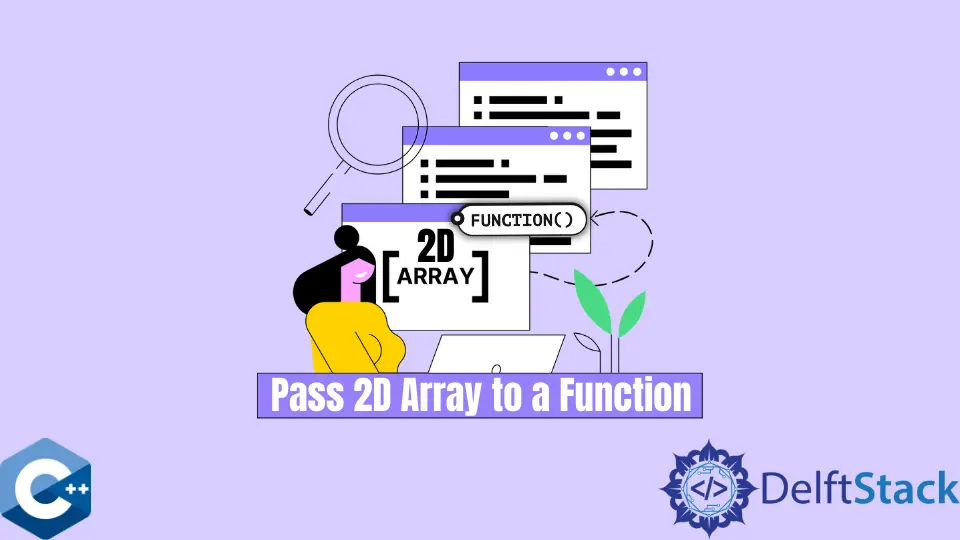如何在 C++ 中將 2D 陣列傳遞給函式
Jinku Hu
2023年10月12日

本文將介紹如何在 C++ 中傳遞一個 2D 陣列作為函式引數。
使用 [] 記號傳遞 2D 陣列作為函式引數
為了演示這個方法,我們定義一個固定長度的二維陣列,命名為 c_array,為了將它的每個元素乘以 2,我們將傳遞一個 MultiplyArrayByTwo 函式作為引數。請注意,這個函式是一個 void 型別,直接對 c_array 物件進行操作。這樣,我們將直接從 main 例程中訪問 2D 陣列的乘法版本。
#include <iomanip>
#include <iostream>
#include <vector>
using std::cin;
using std::cout;
using std::endl;
using std::setw;
using std::string;
using std::vector;
constexpr int size = 4;
void MultiplyArrayByTwo(int arr[][size], int len) {
for (int i = 0; i < len; ++i) {
for (int j = 0; j < len; ++j) {
arr[i][j] *= 2;
}
}
}
int main() {
int c_array[size][size] = {
{1, 2, 3, 4}, {5, 6, 7, 8}, {9, 10, 11, 12}, {13, 14, 15, 16}};
cout << "input array\n";
for (int i = 0; i < size; ++i) {
cout << " [ ";
for (int j = 0; j < size; ++j) {
cout << setw(2) << c_array[i][j] << ", ";
}
cout << "]" << endl;
}
MultiplyArrayByTwo(c_array, size);
cout << "output array\n";
for (int i = 0; i < size; ++i) {
cout << " [ ";
for (int j = 0; j < size; ++j) {
cout << setw(2) << c_array[i][j] << ", ";
}
cout << "]" << endl;
}
cout << endl;
return EXIT_SUCCESS;
}
輸出:
input array
[ 1, 2, 3, 4, ]
[ 5, 6, 7, 8, ]
[ 9, 10, 11, 12, ]
[ 13, 14, 15, 16, ]
output array
[ 2, 4, 6, 8, ]
[ 10, 12, 14, 16, ]
[ 18, 20, 22, 24, ]
[ 26, 28, 30, 32, ]
使用&符號傳遞 2D 陣列作為函式引數
另外,你也可以使用&引用符號來傳遞一個 2D 陣列作為引數。但要注意,這兩種方法只與堆疊上宣告的固定長度陣列相容。請注意,我們把 MultiplyArrayByTwo 函式迴圈改成了基於範圍的,這只是出於可讀性的考慮。
#include <iomanip>
#include <iostream>
#include <vector>
using std::cin;
using std::cout;
using std::endl;
using std::setw;
using std::string;
using std::vector;
constexpr int size = 4;
void MultiplyArrayByTwo(int (&arr)[size][size]) {
for (auto& i : arr) {
for (int& j : i) j *= 2;
}
}
int main() {
int c_array[size][size] = {
{1, 2, 3, 4}, {5, 6, 7, 8}, {9, 10, 11, 12}, {13, 14, 15, 16}};
cout << "input array\n";
for (int i = 0; i < size; ++i) {
cout << " [ ";
for (int j = 0; j < size; ++j) {
cout << setw(2) << c_array[i][j] << ", ";
}
cout << "]" << endl;
}
MultiplyArrayByTwo(c_array);
cout << "output array\n";
for (int i = 0; i < size; ++i) {
cout << " [ ";
for (int j = 0; j < size; ++j) {
cout << setw(2) << c_array[i][j] << ", ";
}
cout << "]" << endl;
}
cout << endl;
return EXIT_SUCCESS;
}
作者: Jinku Hu
Founder of DelftStack.com. Jinku has worked in the robotics and automotive industries for over 8 years. He sharpened his coding skills when he needed to do the automatic testing, data collection from remote servers and report creation from the endurance test. He is from an electrical/electronics engineering background but has expanded his interest to embedded electronics, embedded programming and front-/back-end programming.
LinkedIn